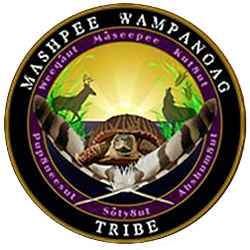
MASHPEE WAMPANOAG TRIBAL LANGUAGE DEPARTMENT
By Jennifer Weston, Our Mother Tongues Co-Producer
Department Overview: The Mashpee Wampanoag Tribal Language Department was established by Council Ordinance 2009-ORD-005 on June 10, 2009 to recognize the role of language as “central to the protection of the customs, culture, and spiritual well-being of the people,” and to acknowledge the “critical state of the newly reclaimed Wampanoag language, and the need to secure its survival for the benefit of future generations.” The department is a unit of the Cultural and Historic Department. The Tribal Council reaffirmed its commitment to language revitalization in resolution 2011-RES-025 to recognize the inherent “birth right of each Wampanoag child adult to speak his or her language given by Creator.”
The Language Department collaborates with the community-run intertribal non-profit organization, the Wôpanâak Language Reclamation Project (WLRP). All tribal household members who enroll in the free language classes offered by project-certified teachers are members of the WLRP Language Committee, which meets monthly to review project activities, progress, and policies. A seven member board of directors provides oversight for all external grants funding and applications.
Founded twenty years ago with the key objective of reclaiming Wôpanâôt8âôk (Wampanoag language) as the principal means of expression within the Wampanoag Tribal Nation, WLRP’s efforts have gained international recognition for becoming the first American Indian community to reclaim and revitalize a sleeping tribal language, even with no recent living speakers.
This unprecedented effort was possible through linguistics training in Algonquian languages, and by working with the largest Native-written corpus of 17th and 18th century documents in North America translated and written by Wampanoag people—including the King James Bibles of 1663 and 1680, and hundreds of personal letters, wills, deeds, and land transactions written in Wôpanâôt8âôk. Wampanoag people were also the first American Indians to develop and use an alphabetic writing system.
Community-Based Language Revitalization:
“Reclaiming our language is one means of repairing the broken circle of cultural loss and pain. To be able to understand and speak our language means to see the world as our families did for centuries. This is but one path which keeps us connected to our people, the earth, and the philosophies and truths given to us by the Creator.”
WLRP and the Language Department are committed to training new generations of fluent speakers of Wôpanâôt8âôk through master apprentice and other language immersion techniques. Twelve language teachers have also been trained and certified to provide instruction for beginners in the complex grammar and structure of Wôpanâôt8âôk. While students of all ages are welcome in community language classes, WLRP’s Language Committee and Board of Directors have prioritized founding a K-3 Wôpanâôt8ây Pâhshaneekamuq (Wampanoag Language Immersion Charter School), based on widespread community demand for children’s language classes.
Weekly classes and language immersion camps will continue as well; however, in order to train a new generation of proficient speakers fully bilingual in both Wôpanâôt8ây and English, a publicly-funded regional charter school will teach all K-3 subjects in Wôpanâôt8ây beginning in August 2015, and aim to add additional grade levels annually.
It is our deep belief that it is through our children and their language acquisition that the long term sustainability of our language can be ensured.
Department Advisory Boards:
*Memoranda of Understanding with the Mashpee Wampanoag Tribal Council, Aquinnah Wampanoag Tribal Council, and the Herring Pond and Assonet Wampanoag Councils.
*Wôpanâak Language Reclamation Project Language Committee and Board of Directors
*Wôpanâôt8ây Pâhshaneekamuq Charter School Founding Board of Trustees
Resources:
For language class schedules and registration forms for upcoming camps, including Summer Turtle (August 5-23, 2013) and Family Immersion Camp (September 13-15, 2013) visit wlrp.org
To see clips from the documentary, Âs Nutayuneân: We Still Live Here, about the Wôpanâak Language Reclamation Project visit the following sites:
mwtribe.exstream.tv/human_services#
www.ourmothertongues.org
www.pbs.org/independentlens/we-still-live-here/
www.makepeaceproductions.com